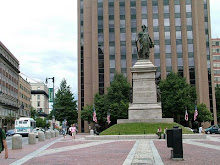A Warm Welcome
The plate shattered in a thousand different pieces. Those of us who were there stood looking on, horrified, unsure of what to do next. We were standing in a museum, and a volunteer had accidentally dropped a family seder plate owned by the director. The director, whom the plate belonged to, immediately told the volunteer very strongly and powerfully "Don't even worry about it. It's over, it's done with, let's move on!" The woman who broke it said "Oh, I feel so bad!" The director said, "It doesn't matter, I don't want you to feel bad about it. You did good work for me today and I am thankful for that. The object doesn't matter." What struck me was not so much that she came to that conclusion, as most people will come to that conclusion eventually. That it was her very first response, however, seemed unusual. It was instinctual, to take care of the other person's emotions. To know that people were more important than things. This one story, to me, encapsulates the spirit of this woman more than anything else I can think of.
Buildings are more than just plaster and wood. Buildings have their own spirit and energy, created by the people who inhabit them. For five months from February to August of 2014, I had the opportunity to work with the woman who created the most welcoming environment I have ever experiened at a Portland, Maine museum celebrating Jewish history and culture. “My job,” she would often say, “is first and foremost to make people feel welcome.” I can say with utmost certainty: she succeeded. With the visitors that came to look at the art and history exhibits, and with the volunteers who came to help with the running of the museum and the chance to be a part of something bigger than themselves, her love of what she was doing was always evident.
My job was to research Jewish summer camps in Maine. For several months, I plugged away researching a long list of them for an eventual exhibit that was planned. My memories, however, center more around what happened while I was doing this than they do on what I learned from my research. What I learned was no less than how to be human. In the process of this project, she taught me an awful lot about having compassion for myself.
“I can’t focus, and I feel like I’m not getting enough done. I’ve been here two hours and I’ve gotten like two camps done,” I said to her one day.
“Each time you come, a little more gets done. That’s all that matters to me!” she said, without missing a beat.
During a conversation that turned to more personal matters, I volunteered something that I had not told anyone else before. Nervous, I said, “What are you thinking? Am I a horrible person?”
“No! I have compassion for you.”
“What does that mean?” I said, knowing the dictionary definition, but not how it applied to this situation.
“It means I see your struggle, and I have empathy for you.”
“Ohhh.” With that, a mental shift occurred. My shame and self-doubt flipped around and I began to see how someone could view me as simply a person with problems to solve, instead of a person who was intractably distasteful. There had not been anyone in my life who had taken the time to show me this before. Perhaps they wrongly assumed that I already knew.
“Why don’t you like hugs?” she asked me one day. I didn’t know. I just knew they felt uncomfortable and wrong. I realized that I was missing out on a lot of affection, though. A few months passed, and I realized that deep hugs were comfortable, and light hugs felt like of like a mosquito biting you - enough to startle you, but not enough to comfort you. With this new knowledge of how to advocate for myself, I started asking for hugs every time I was there.
Perhaps the best way, however, to express how much she meant to me during these months is not to describe the things that happened, but to tell you what didn’t happen. Conspicuously absent was the fear, the anxiety and the racing thoughts of “doing it wrong” that characterize most of my interactions with other people. This woman is on a very short list of people in my life who can make feel heard. A very short list of people who I felt genuinely valued what I had to say, who wanted to know more. With her, I did not feel like a burden. She hung onto my every word, and her face communicated such acceptance. I didn’t have to pretend or choke on my words. I felt valued.
Yet another roommate situation exploded in a sea of conflict, and it was time for me to move out again. In despair, knowing I couldn’t live with a roommate and couldn’t live with my parents, I confided in her. A combination of severe anxiety, sensory issues and negative past experiences made me believe that I couldn’t live in an apartment on my own. It was, however, the only remaining option. She believed I could do it, so I started to, if not believe, at least attempt to set in motion some steps to achieve that goal. I was terrified every day, even just looking at apartment ads, let alone taking the steps needed to view and apply for the apartments. But there I was, and there she was, and I had to do something with my time. So I started calling ads, and with the help of a wonderful man I met also connected with the museum, I started looking at the apartments. I arranged funding. I started to imagine that I could do this, or at least that I could take the steps to try. As luck would have it, I was able to find an apartment that worked for me, after seven years of trying to accomplish this. Why was I successful? I feel it was because someone took the time and effort to make me feel safe and supported. It wasn’t in what she said, but in how she said it. It was in the nonverbal messages of “I get you” and “I know how awful it is, but I think you can do it anyway” that kept the racing, paralyzing thoughts of despair away long enough for me to actually change my life.
The goal of this particular museum was to encourage a love of Jewish life and culture. After spending time here, I started going to a local synagogue and contemplating Jewish research projects I could do. I met so many warm, friendly and intelligent people in the Jewish community, which fostered a real respect in me for the Jewish community. This, my friend created, not just for me but for everyone who walked in that door. But what she did in her capacity of director at the museum went beyond creating love for Judaism. She created self-love for those who needed it, and fostered connections and love for and between everyone who was part of the museum in any way.
I ran into her yesterday at a coffee shop, and when I realized who it was I threw my arms around her and gave her a hug. A smile lit up my face. Reflecting later in the day, I realized it was only time I could ever recall spontaneously hugging someone. Hugging, for me, is usually an act that results from a careful analysis of risks and benefits. This apprehension comes from the sensory sensitivities I often experience.
However, there is one thing that is apparently more powerful than fear, and that is love. No one in my life has exemplified this more than her, and I am thankful for the opportunity to learn this lesson - but a little sad that the time I got to experience it was so short. I took risks for her that I wouldn’t have in any other situation, and was motivated to challenge myself. With her, my heart was full of love, instead of pain. I know that I will never forget what it felt like to want the company of another person more than I wanted to avoid what I was afraid of.







